Op-Ed: World leaders have figured it out: You can play America by playing Trump’s ego

- Share via
Never mind nuclear fears about North Korea and Iran. Set aside concerns about Russian cyberattacks. World leaders today are racing to harness a different source of power to tip the geopolitical balance in their favor.
From Moscow to Pyongyang, from Paris to Jerusalem, presidents, prime ministers and dictators-for-life are seeking to weaponize Donald Trump’s vanity.
Different leaders are using different approaches. South Korean President Moon Jae-in gave President Trump credit for a diplomatic breakthrough with North Korea, to ensure Trump saw peace as a potential legacy issue. French President Emmanuel Macron literally and figuratively stroked Trump, with the goal of getting him to preserve the Iran nuclear deal.
Israeli Prime Minister Benjamin Netanyahu put on an internationally televised show just for Trump, tailored to make Trump feel that his long-expressed hostility to Iran was justified. China’s leader, Xi Jingping, and the Saudi king both rolled out the red carpet for Trump in ways they did not for President Obama, ensuring that Trump felt special.
Some leaders have played on Trump’s fear of humiliation. The prosecutor general of Ukraine has stopped supporting the Mueller investigation in order to curry favor with Trump and to ensure that certain arms deals would move forward, according to the New York Times.
Russian President Vladimir Putin has proved a virtuoso at playing Trump’s fragile ego, sometimes propping him up with glowing reports from Russian propaganda outlets, other times firing warning shots.
There is nothing new, of course, about leaders flattering one another. Indeed, we have institutionalized flattery in international relations with the pomp and circumstance of official welcomes, 21-gun salutes and state dinners.
French President Emmanuel Macron literally and figuratively stroked Trump, with the goal of getting him to preserve the Iran nuclear deal.
But with those ceremonies, we are paying deference to entire nations, not necessarily to the individuals who happen to represent them. With Trump, we have entered new territory.
In his short time in office, Trump has revealed himself to be unlike his predecessors in several important ways. Although all presidents have egos, Trump has spent his career promoting his own personal brand, inscribing his name in big gold letters wherever he could. He has shown himself to be extraordinarily self-absorbed, providing a constant stream of self-congratulatory remarks.
He has claimed credit for economic recoveries that started years before he assumed office, for launching the career of Lady Gaga and for business deals he had nothing to do with — not to mention the supposedly record-breaking inauguration crowd that wasn’t.
All of this sends a message to other world leaders. As one former U.S. Cabinet official who deals regularly with foreign leaders put it to me: “They know he can be played.” Or, as a prominent business leader said during a trip to China in April: “He is so vain. He’s like a child — easy to manage if you know what he wants.”
It’s not just Trump’s sensitivity and insatiable hunger for the spotlight that make him easy pickings. He has institutionalized his egotism in a way no previous American president did.
Trump has demoted and devalued entire departments and processes that once distributed power through the government. He has concentrated power in the Oval Office and made it clear that he will not tolerate being upstaged by his Cabinet. His administration’s cringe-worthy fawning over him shows that the members understand their public service is all about serving one man.
The institutions of our government are supposed to depersonalize the process of governing, to offset the power and interests of individuals. As Trump undercuts these institutions, putting himself and his feelings at the center of everything, he has made global affairs revolve around his own vanity and foibles.
This is dangerous in the best of times. It is especially dangerous when the leader in question is under siege, ill-informed and impulsive — and when those who seek to influence him know it.
As these circumstances worsen, and as more power is concentrated in one self-absorbed man, it is increasingly likely that the challenges of our time will be resolved not according to their merits, but by how Trump feels they make him look when he looks in the mirror.
David Rothkopf is a visiting scholar at the Carnegie Endowment for International Peace, host of the “Deep State Radio” podcast and an author of many books on international affairs.
Follow the Opinion section on Twitter @latimesopinion or Facebook
More to Read
A cure for the common opinion
Get thought-provoking perspectives with our weekly newsletter.
You may occasionally receive promotional content from the Los Angeles Times.









